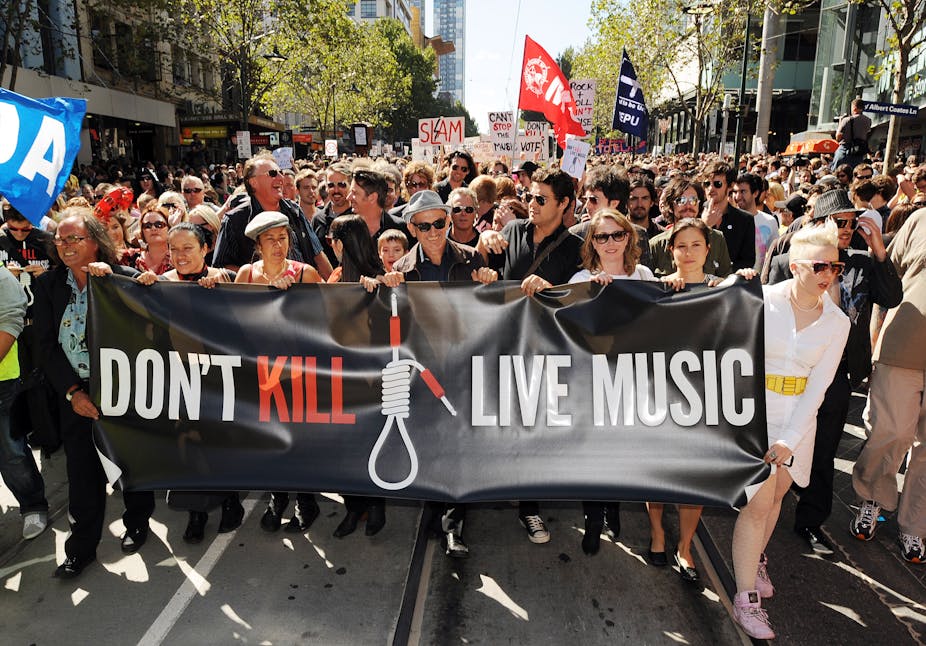In this week’s news from planet 21st century, the musicians who perform at Playbar, a small venue in the inner-city Sydney suburb of Surry Hills, have been silenced by Sydney’s “offensive noise” laws after complaints by Greens senator Lee Rhiannon, whose electoral office is in the same building.
This is despite the Greens having previously been advocates of live music in Australia, including supporting an event to save live music at Sydney’s Annandale Hotel last month, and being key proponents of the annual Save Live Australian Music (SLAM) rallies.
The move by Rhiannon and the City of Sydney council is a comment on the volume level rather than the skills of the musicians concerned, and I intend to move to Surry Hills immediately, as the local great and good obviously do not feel that they have any real crime against which they need to legislate.
But this silly silencing raises a sensible question: when you can listen to music from the comfort of your favourite armchair while sipping a nice red, why would you instead pay more than North Korea’s GDP for a gig in which the bloke in front can’t decide whether to block your view with his phone camera, spill his pint on your shoes, singe your eyebrows with the lighter he is waving an inch from your pupils, or use his headbanging to whip you in the face with his dreadlocks (which really hurts - trust me).
OK, so I’m clearly middle-aged, but from a strictly logical standpoint, loud, live music is not always the magical mystery tour promised on the poster.
But loud, live music makes business sense for the venues that support it, remaining one of the best ways of persuading customers to come to your bar and buy drinks. Research shows that stimulating pre-recorded music causes people to drink more quickly, and listening to loud, live music in a bar ought to have the same effect and increase profits. It might be because you experience a heightened state of arousal which compels you to drink faster. Or it could be simply that if you are stood in a bar and can’t hear what anyone else is saying then there is little else you can do but drink.
Seeing musicians in the flesh also makes for a better experience for the listener. I did some unpublished research a few years ago for a British not-for-profit called PRS for Music, which collects royalty payments on music performed in public. We hired a Simon and Garfunkel tribute band to play downstairs in a two-storey venue, while in the bar upstairs we had a jukebox playing just the same songs in just the same order. Everyone went downstairs.
Why is live music so popular then? It’s probably in part because hearing music in crowds leads to a heightened sense of arousal, and so more intense emotions: many of people’s strongest experiences of music occur in crowds. But my friend Jane Davidson thinks that the answer may be more subtle. Her research shows that being able to see the body language of the musician (rather than just hearing an audio recording) can itself add meaning to the music: the body movements help performers to communicate their expressive intentions, so that Elvis’s gyrating hips made his music sexier to a live audience.

The physical attractiveness of a musician helps directly too. In one piece of research, I played people 40 songs while showing them a photo of the musicians who supposedly performed each. Attractive performers were rated as more sophisticated, emotionally warm, feminine, intelligent, and likely to be popular; and music performed by attractive performers was liked more, perceived as more sophisticated, and as possessing more artistic merit. Moreover, the effect was immune to the sex of the “musician” and the sex of the person responding: music by attractive males was just as popular among men as it was among women.
But amazingly you do not even need to know what the musician looks like in order to be influenced by their physical attractiveness. Judges are more positive about music by attractive performers who they have never seen. One possible explanation is that attractive musicians simply receive better tuition and guidance, and so end up actually being better.
So, the delicate residents of Surry Hills can be pleased that next time they go to a gig they will be less likely to wake up in the morning with a hangover. But pre-recorded music is a poor substitute for live concerts, and by making it just a little harder to find good live music the emotional life of Surry Hills will be poorer. Stadium rock gods Kiss put it far more succinctly in their magnificent song Crazy Crazy Nights: “this is our music and we like it loud”.

